With its high efficiency and simplified analysis, the TA Instruments Rapid Screening-Differential Scanning Calorimeter (RS-DSC) is a potent and adaptable tool that revolutionizes the testing of biological drugs for thermal stability.
To ensure product quality and support regulatory approval, scientists working in the demanding field of biological drug development must have a solid understanding of biomolecule stability under temperature variations.
Testing for short-term thermal stability guarantees efficacy, forecasts shelf life, and shows how resistant a compound is to heat stress. However, measuring this accurately in a high-throughput setting without interfering with workflow or meeting deadlines is difficult.
In response to this need, the Rapid Screening-Differential Scanning Calorimeter (RS-DSC) was created. It is a novel tool for quickly assessing biotherapeutic thermal stability.
TA Instruments RS-DSC:
- Accelerate thermal stability testing: The TA Instruments RS-DSC analyzes up to 24 samples at once, providing detailed insights into drug product thermal stability much more quickly. The technology also makes it easier to characterize highly concentrated drug products.
- Improve efficiency: TA Instruments RS-DSC uses disposable Micro Fluidic Chips (MFCs) to hold the sample, ensuring that materials are used effectively. MFCs have a sample volume requirement of less than 15 µl, and their design makes operations cleaner and more efficient by eliminating the need for laborious sample dilution, frequent instrument cleaning, and contamination hazards.
- Make more informed decisions: The TA Instruments RS-DSC generates a larger volume of data, which NanoAnalyze™ Software easily manages while offering detailed, accurate information about a molecule's thermal stability and thermodynamic characteristics.
Groundbreaking capabilities
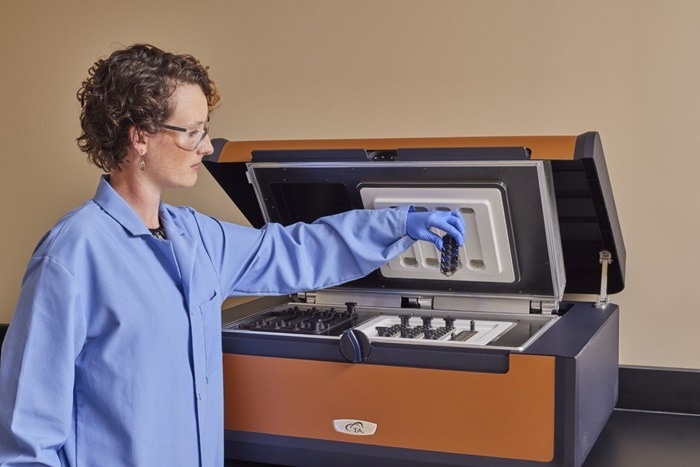
Image Credit: TA Instruments
- Enhanced throughput: The TA Instruments RS-DSC significantly expedites research and the introduction of biological drugs into the market by allowing the analysis of 24 samples at once.
- Resource efficiency: The TA Instruments RS-DSC's minimal sample volume requirements help guarantee optimal material use and reduce costs.
- High concentration proficiency: The TA Instruments RS-DSC is a unique instrument capable of efficiently and effectively analyzing drug products with very high concentrations. It performs exceptionally well in testing a wide range of sample concentrations.
- Simplified workflow: The disposable microfluidic chips lessen or eliminate the need for cleaning and lower the risk of contamination, while the TA Instruments RS-DSC simplifies operations by eliminating the need for sample dilution when working with high-concentration samples.
- Extensive data analysis: NanoAnalyze Software organizes data and offers in-depth analysis to maximize progress.
Features and Benefits
- Parallel analysis: To speed up research, a special high throughput analysis allows for up to 24 simultaneous measurements
- Single-use microfluidic technology: MFCs minimize cleaning time and contamination risks while streamlining the characterization of high-concentration drug products
- Cutting-edge software for data analysis: For a thorough and quick assessment, data is automatically and reliably analyzed by the powerful and intuitive NanoAnalyze Software
Source: TA Instruments
| RS-DSC |
|
| Cell Geometry |
Disposable microfluidic |
| Cell Material |
Glass |
| Sample Format |
MFC (Micro Fluidic Chips) |
| Working cell volume |
11 µL |
| Sample Capacity |
24 MFCs |
| Typical Sample Concentration |
20 mg/mL – 330+ mg/mL IgG (protein-dependent)1 |
| Sample throughput |
> 96 samples/day |
| Temperature Range |
20-100 °C |
| Temperature Scan Rate |
1 or 2 °C/min |
| Temperature accuracy |
± 0.2 °C (across all calorimeters); ± 0.1 °C reproducibility2 |
1 Using lysozyme in 0.1 M glycine buffer at pH 2.5 at 1 °C/min
2 Using DPPC in water at pH 7 at 1 °C/min Accelerate research, improve efficiency, and make more informed decisions with the TA Instruments RS-DSC, a revolutionary new high-throughput thermal stability testing instrument specifically designed for biologic drug development.
Technology
Groundbreaking capabilities
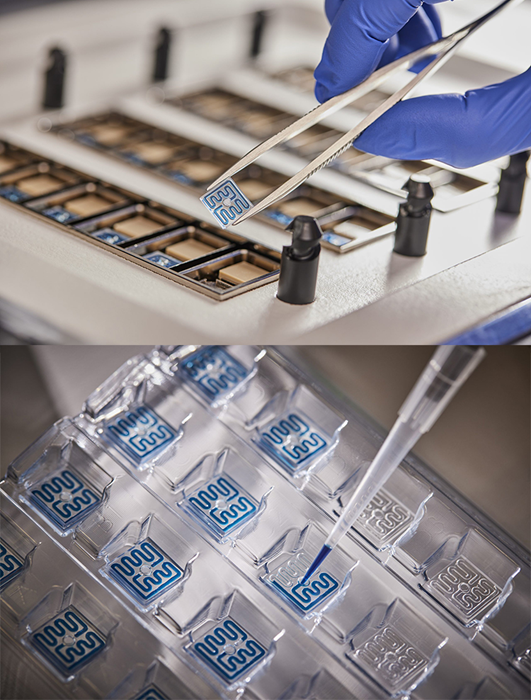
Image Credit: TA Instruments
By simultaneously analyzing 24 samples, the TA Instruments RS-DSC significantly scales up from conventional single-sample approaches, redefining the landscape. Compared to traditional capillary DSCs, it uses less than 15 µL per sample and, on average, gives a clearer picture of the thermodynamics of unfolding than differential scanning fluorescence (DSF).
Microfluidic technology: The future of precision and convenience
With its state-of-the-art MFCs (Micro Fluidic Chips), the TA Instruments RS-DSC is built to easily contain the sample. By eliminating the need for frequent cleaning of the instrument measurement cell in between runs, this technological integration saves time, lowers the possibility of contamination, and makes it possible to obtain more accurate and consistent readings.
The MFCs are disposable and improve operational efficiency, allowing quick transitions and protecting the instrument from hazardous substances. The novel MFC design exemplifies cutting-edge, low-volume, single-use technology, allowing easy sample loading and preparation using standard lab equipment. A sample can be prepared, sealed, and ready for analysis in less than a minute, with minimal volumes required for precise evaluation.
Applications
The TA Instruments RS-DSC is suitable for a wide variety of applications in biological drug development, including:
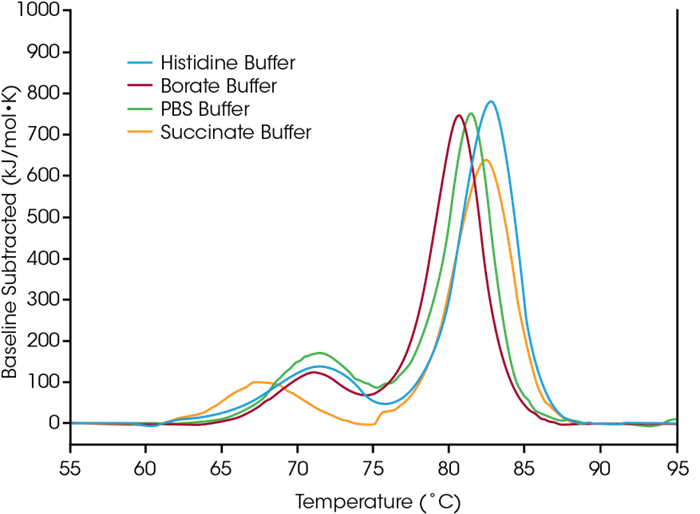
Image Credit: TA Instruments
Formulation buffer screening
A biological drug product’s overall clinical success is largely determined by its thermal stability, and Differential Scanning Calorimetry (DSC) is a key instrument for determining how the solution environment affects protein stability. Changes in variables like pH, buffer, ionic strength, excipients, and detergents can significantly impact protein stability, causing small shifts in Tmax or shifts up to tens of degrees.
To show how data from formulation screening can help in the selection of buffer components, the antibody trastuzumab was tested in four common buffer conditions: 1) A standard working buffer (PBS), 2) A lysine-conjugation enabling buffer for labeled antibody synthesis for cellular trafficking studies or drug conjugation (borate), 3) A trastuzumab-based antibody-drug conjugate (succinate), and 4) trastuzumab's native formulation buffer (histidine).
The histidine, borate, and PBS buffers do not significantly impact the first unfolding event, corresponding to the CH2 domain unfolding. However, the succinate buffer destabilizes the CH2 domain, lowering the onset of unfolding and Tmax,1 by approximately 3°C.
The histidine and succinate buffers have the highest stabilizing effect on the main transition, reflecting the Fab and CH3 unfolding events, with a Tmax,2 of 82.66 °C. With a Tmax,2 of 80.69 °C, the main transition is least stable in the borate buffer. Not surprisingly, the histidine buffer utilized in the final formulation of the approved drug product is the most stabilizing buffer formulation for trastuzumab in this sample set.
Protein mutational analysis – Characterize engineered protein modifications to understand the structural impact on molecular stability
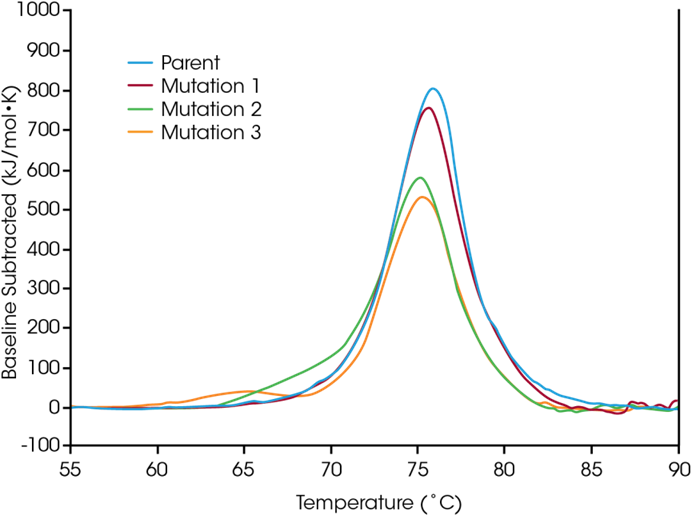
Image Credit: TA Instruments
Proteins can be mutated to improve their structure and function, and even small changes to one amino acid can have a discernible impact on the stability of the protein as a whole. Understanding the structural effect of the mutation on the protein as a whole and using DSC to support the characterization of engineered protein modifications can help inform decisions made in the pipeline for developing biological drugs.
An engineered protein panel was screened for variations in thermal stability resulting from single amino acid mutations in the protein sequence to illustrate the various effects sequence modification can have on stability.
Unfolding in the parent happens at a Tmax of 75.92 °C within a single major thermal transition. Mutation 1 is a single amino acid mutation that does not significantly affect the protein's short-term thermal stability. Mutations 2 and 3 demonstrate the significant effects of other single amino acid mutations on the protein’s stability.
Change does not always have the same effect; rather, it depends on the site of the modification and the physicochemical characteristics of the new amino acid, as demonstrated by the notable destabilization in Mutation 3. Balancing the desired functional benefits of sequence modification with the overall structural stability of the protein can help understand the relationship between structure and function and develop advanced therapies.
Concentration Dependence – Investigate stability changes in highly concentrated drug products
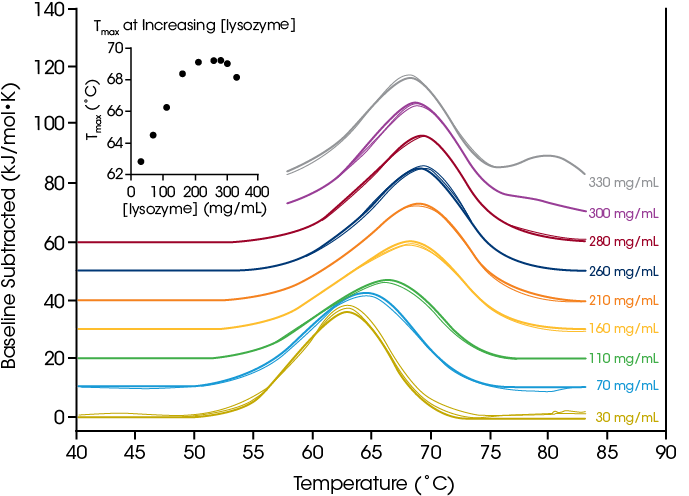
Image Credit: TA Instruments
Focusing on antibody drugs and antibody-drug conjugates, the TA Instruments RS-DSC is specially engineered to handle high-concentration biologic drug samples. The pharmaceutical industry is becoming more interested in high-concentration dosage forms that allow for subcutaneous and ocular drug delivery due to the increasing success of antibody therapeutics. As a result, formulations with antibody concentrations ranging from 50 to 150 mg/mL are frequently used and can reach 200 mg/mL or higher.
Protein formulation at high concentrations can make a protein more prone to physical instability. On the other hand, some case studies have demonstrated improved thermal stability at higher concentrations. Hence, one of the most important metrics for reducing the risk associated with pharmaceutical products is the comprehension of thermal unfolding and reaction to the solution environment at the formulation concentration of interest.
TA Instruments assessed chicken egg white lysozyme from 30 to 330 mg/mL in glycine buffer to show that it is possible to test protein samples at high concentrations and to highlight the significance of testing at the intended formulation concentration.
Lysozyme is frequently used as a reference test sample for DSC because it has a straightforward single transition thermogram at low concentrations (~1 mg/mL). A concentration dependence on lysozyme stability was noted by evaluating protein concentrations up to 100 times higher.